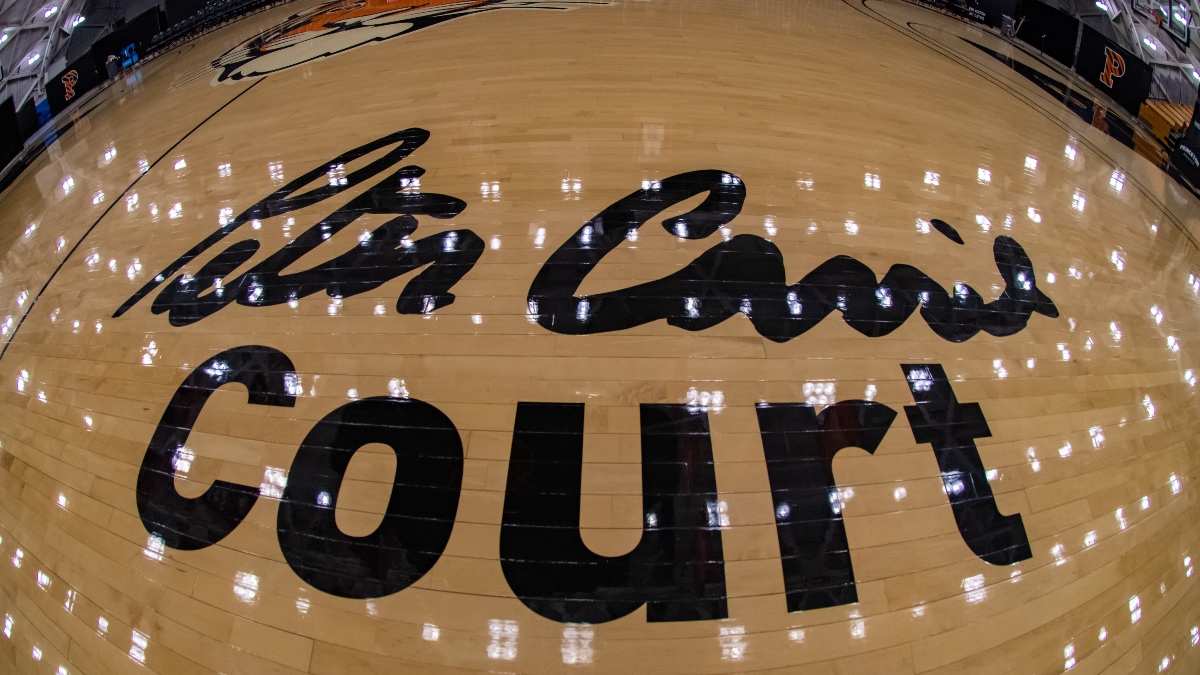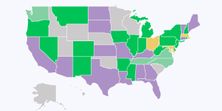New Jersey College Betting Proposal Could Correct Shortcoming
John Jones/Icon Sportswire via Getty Images. Pictured: General view of Jadwin Gymnasium in Princeton, N.J.
New Jersey has largely been the gold standard for U.S. sports betting.
Its competitive tax rates and multiple-skin model are among the more operator-friendly in the country. Statewide, remote sign up for any legal sportsbook is a boon to bettors. Its regulators are among the most lauded in the country.
This, plus New York’s failure to permit online wagering, has made New Jersey the most lucrative sports betting market in the country. In just October 2020, New Jersey sportsbooks took in more than $800 million in wagers, a single-month record for any state.
It’s now topped total handle in Nevada, long the nation’s lone legal single-game sports betting market, in each of the last five months and currently taking steps to correct one of its few shortcomings.
Lawmakers introduced a constitutional amendment that would allow wagering on college sports in New Jersey. Initially just a proposal that would permit bets on college events played in the state, an expanded version would allow wagering on in-state programs as well.
This college sports prohibition was one of the few restrictions that have hurt New Jersey’s legal market and pushed bettors toward offshore sites or unregulated bookmakers. Though New Jersey’s college programs aren’t major drawls for any sportsbook, this prohibition is among the factors turning would-be legal bettors back to the illegal markets.
Studies show that roughly half of all sports bettors aren’t even aware they’re gambling illegally. The regulated industry, two-and-a-half years after the Supreme Court struck down the federal wagering ban and allowed single-game betting outside Nevada, is still only eight percent of the estimated illegal betting handle's size.
Now, the nation’s highest-grossing sports betting state is positioned to close one final loophole in what has already emerged as arguably the nation’s most successful market.
New Jersey Betting Background
Looking to boost gaming revenues in the wake of the great recessions, New Jersey political leaders pushed a constitutional amendment that would legalize sports betting in the state, a proposal voters overwhelmingly approved in 2011 even though federal law prevented it from taking effect.
New Jersey then began a multi-year legal push to legalize sports betting, which at times seemed like a long-shot pursuit but ultimately led to the Supreme Court overturning the federal wagering ban and allowing New Jersey to accept sports bets beginning in May 2018.
However, New Jersey’s original constitutional ballot measure didn’t carve out an exemption for legal bets on in-state college teams or any other collegiate sporting event played in the state. The NCAA, joined by the four major American professional sports leagues, led efforts to prevent legal sports betting in New Jersey, claiming increased gambling exposure threatened the integrity of its competitions.
Like Americans' attitudes toward gambling overall, the fear of sports betting corruption, even on the ostensibly amateur college-level competitions, have shifted in recent years.
Leading industry advocates such as the American Gaming Association pushed lawmakers in the other states considering legal sports betting to allow college wagering, arguing well-regulated legal option was not only less of a threat to student-athletes, but the only way to counter the estimated $150 billion illegal sports betting market.
By 2020, most of the roughly 20 states with legal sports betting had allowed in-state college betting, with the University of Colorado even striking a partnership with PointsBet. Meanwhile the NCAA, which had kept its postseason competitions out of Nevada because of legal gambling, announced this year it would award dozens of future championship event host sites in states with legal wagering.
One of those NCAA events includes 2025 Men’s Basketball Tournament games at the Prudential Center in Newark. State Sen. Paul Sarlo introduced a bill shortly after the announcement that would allow wagering on in-state college events. A few weeks later, he expanded the bill to include in-state college programs, meaning New Jersey bettors could wager on programs such as Rutgers, Seton Hall and Princeton.
The bill passed unanimously in the Senate Budget and Appropriations Committee. It will still need approval before the full Senate and General Assembly, which likely won’t come until 2021, but seems almost assured to pass with widespread support.
The bill would then place a constitutional amendment question on the state’s 2021 ballot. Garden State voters supported legal sports betting before it was technically legal and seem almost assured to do the same for such a proposal next year.
Future Implications
This could remove one of the few remaining blemishes on what has otherwise been the nation’s sports betting leader in the two-and-a-half years following the Supreme Court’s decision. It could also help influence other states considering college sports betting.
The most recent wave of states with legal wagering have largely permitted in-state college betting in their respective legislation, including high-profile college markets such as Colorado, Tennessee and Michigan.
However, that has been far from unanimous.
Virginia, home to marquee programs such as the University of Virginia men’s basketball and Virginia Tech football, will not allow in-state college wagering when it launches its market in the coming weeks. Massachusetts university officials are pushing their state’s fledgling sports betting bill to include a college betting prohibition as well, despite outspoken opposition from gaming stakeholders.
A successful college prohibition repeal in New Jersey could be another boost toward regulated college betting. Time and again, industry officials have shown bettors will turn to unregulated markets if their preferred option isn’t available at a licensed sportsbook. The likely 2021 amendment could help rectify New Jersey’s self-imposed prohibition and again serve as the model for other states considering legal wagering.
How would you rate this article?


